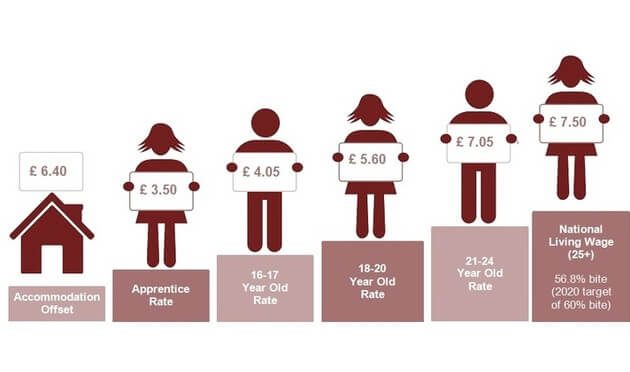
National Minimum Wage and National Living Wage Increases
Employers need to get ready for the increase in the National Minimum Wage and National Living Wage on 1st April 2017.
National Minimum Wage
The National Minimum Wage is the minimum rate of pay per hour someone is entitled to by law and depends on a worker’s age and if they’re an apprentice.
From 1st April 2017, the following National Minimum Wage rates will be:
- For workers aged 21 to 24, the rate increases from £6.95 to £7.05
- For workers aged 18 to 20, the rate increases from £5.55 to £5.60
- For workers aged 16 and 17, the rate increased from £4.00 to £4.05
- For apprentices under the age of 19 or those aged 19 and over who are in their first year of an apprenticeship, the rate increased from £3.40 to £3.50
- Accommodation offset increased from £6.00 to £6.40
The National Living Wage
The Government’s National Living Wage was introduced in April 2016 for all workers aged 25 and over and was initially set at £7.20 per hour. From 1st April 2017, the rate will increase to £7.50 per hour.
Key Points
Workers must be at least school leaving age (last Friday in June of the school year they turn 16) to get the National Minimum Wage.
There are several exemptions to those who receive the National Minimum and National Living Wage. These include:
- Self-employed people
- Voluntary workers
- Company directors
- Family members or people who live in the family home of the employer and assist with day to day tasks.
All other workers are entitled to the correct minimum wage if they’re:
- Part-time
- Casual labourers, for example someone hired for one day
- Agency workers
- Workers and homeworkers paid by the number of items they make
- Apprentices
- Trainees, workers on probation
- Disabled workers
- Agricultural workers
- Foreign workers
- Seafarers
- Offshore workers
Non-compliance
It is against the law for employers to pay their workers less than the correct minimum wage.
If HM Revenue & Customs find that an employer hasn’t paid the correct minimum wage, they can send a notice of arrears plus a financial penalty for failure to comply.
Earlier this year, the government announced a new awareness campaign to ensure that workers know how much they are legally entitled to. For more information please go to the following link: www.gov.uk/government/news/revealed-most-bizarre-excuses-for-underpaying-staff-the-national-minimum-wage
Contact us
For more information about the wage increases please contact nigel.atkinson@hghyork.co.uk or clare.walker@hghyork.co.uk or call 01904 655202.
Image Source: www.gov.uk







